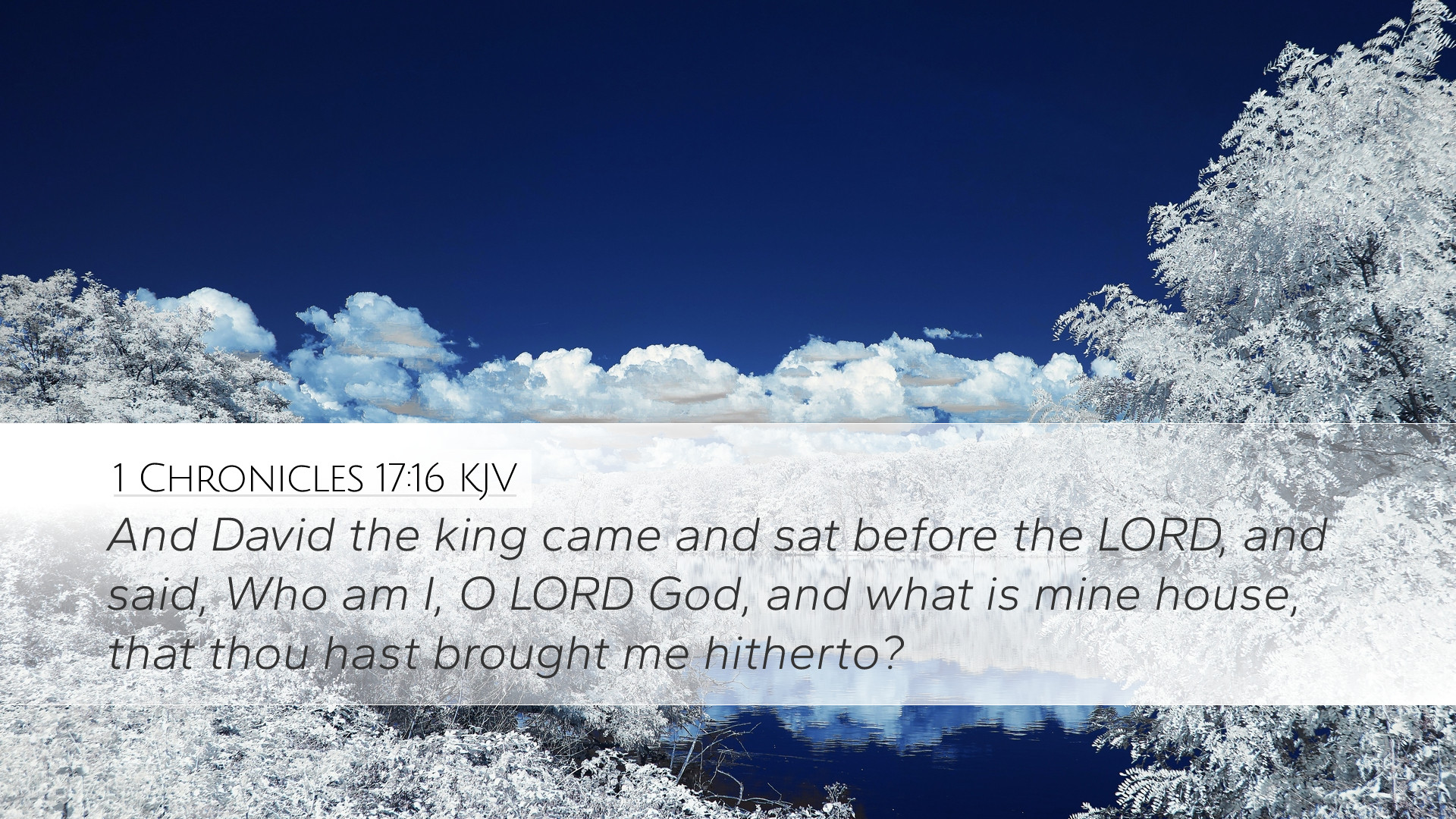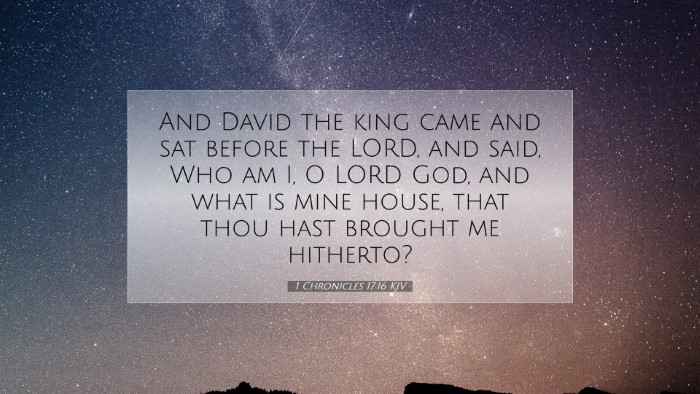Commentary on 1 Chronicles 17:16
Verse: "And David the king came and sat before the Lord, and said, Who am I, O Lord God, and what is my house, that thou hast brought me hitherto?" (1 Chronicles 17:16 KJV)
Introduction
This verse captures a profound moment of humility and worship as David reflects on God's blessings and his own unworthiness. It serves as a crucial insight into the nature of God's grace and the relational dynamic between the Creator and His creation. In this commentary, we delve into the theological implications of this verse by synthesizing insights from various public domain commentaries, particularly those of Matthew Henry, Albert Barnes, and Adam Clarke.
The Context of the Passage
This verse is situated within a larger narrative where God speaks to David through the prophet Nathan regarding the establishment of David's dynasty. It marks a pivotal turning point in the history of Israel, focusing on God's covenantal promise and the significance of David's lineage. David's response reflects a deep theological understanding of God's grace, sovereignty, and mercy.
Matthew Henry's Insights
Matthew Henry emphasizes the importance of David's posture before the Lord. His sitting before God suggests a desire for communion and dialogue. Henry notes the humility expressed in David's rhetorical questions. These questions highlight David's awareness of his defined social status and the grace bestowed upon him:
- Who am I? - This reflects David's astonishment at being chosen as king and designated as a central figure in the line of the Messiah.
- What is my house? - David recognizes the significance of his family lineage, understanding that his achievements and identity are not self-derived but divinely appointed.
Henry argues that this attitude of humility is essential for anyone in leadership. It reminds leaders of the importance of relying on God’s guidance rather than their own strength.
Albert Barnes' Analysis
Albert Barnes highlights the covenantal context of this verse. He points out that David's inquiry is not merely a reflection on his personal identity but a recognition of God's promises regarding his descendants:
- Covenantal Instinct: Barnes notes that David’s questions are anchored in the understanding of God’s covenant with Israel. David is aware that the blessings being poured out on him are part of God’s overarching redemptive plan.
- Worship in Humility: The act of sitting before the Lord signifies a posture of worship that is both humble and reverent, essential for understanding one’s place in God’s redemptive narrative.
Barnes also suggests that David’s reflection invites readers and believers today to consider their role within God’s divine purpose and encourages a humble approach to God.
Adam Clarke's Commentary
Adam Clarke offers a detailed exploration of the term "hitherto." He explains that this term indicates a journey marked by divine protection and providence. Clarke suggests that David's statement is not merely an expression of his past but an acknowledgment of God's continuing faithfulness:
- Faithful Preservation: Clarke underscores that David reflects on God’s guidance throughout his life, indicating a sustained relationship characterized by God’s provision.
- Reflective Praise: Clarke urges readers to see that this response should lead to a life of worship. When believers remember God’s past faithfulness, it ignites a response of gratitude and praise.
Moreover, Clarke emphasizes the covenant aspect, pointing out that the future of David's descendants is intertwined with God’s promises, hence inviting an expectant faith.
Theological Implications
As we draw insights from these commentaries, several key theological implications emerge from this verse:
- The Nature of Divine Grace: David's query reveals the scandal of grace—that God would choose an undeserving person for such a sacred role. This principle transcends David's narrative and echoes through all of Scripture, showcasing God's inclination to use the humble and the weak for His mighty purposes.
- The Importance of Humility: In leadership and in life, humility is exalted. David's recognition of his own smallness before God sets a precedent for spiritual leaders and all believers alike—demonstrating that true greatness in the Kingdom of God begins with humility.
- Covenantal Faithfulness: The acknowledgment that God is systematically orchestrating history through covenants encourages believers today to trust in God’s promises. Understanding one's role within the covenantal scope stirs a deeper relationship with God.
- Personal Reflection and Worship: David’s response invites believers to engage in personal reflection on their relationship with God. Recognizing God’s provision encourages a lifestyle of worship characterized by gratitude.
Conclusion
In 1 Chronicles 17:16, David’s meditation on God’s goodness offers rich insights for pastors, students, theologians, and Bible scholars. This verse encapsulates a profound attitude of worship that emerges from a recognition of God’s grace and faithfulness. The commentaries by Matthew Henry, Albert Barnes, and Adam Clarke collectively emphasize that David's humility and reflective awareness are not just personal sentiments, but a message for us all: to embrace our identity in Christ, grounded in grace, and to live out our calling with reverent humility and profound gratitude.


